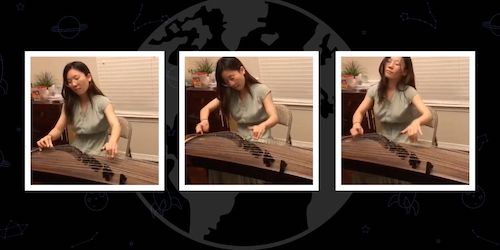This month Planet Classroom Network audiences can watch Bard alumnae Yixin Wang of Bard College’s US-China Music Institute perform 临安千古愁 在古筝上. The guzheng is the most commonly played instrument in China and can have up to 26 strings. Yixin’s beautiful rendition of the song was recorded from her home. Wang was one of the four first-year students in the double degree program of the Bard College Conservatory of Music (BCOM) and its US-China Music Institute, in partnership with the Central Conservatory of Music (CCOM) in Beijing. The program combined the professional study of traditional Chinese instruments with a Western-style, 文科教育.
全球搜索教育 is pleased to welcome Yixin Wang.
Yixin, your performance was inspiring. How have you handled not being able to perform in front of a live audience during the pandemic? Can you share your perspectives on the pros and cons of live performance versus online performance?
Not being able to play in front of a live audience was definitely devastating for me. I enjoyed interaction with the crowd and it’s just not the same in front of a camera. I really miss the excitement of getting on big stages and speaking and playing in front of thousands of people. 但…与此同时, online performances also have great advantages and I would be able to share Chinese music and culture with people all around the world easily without any travel barriers. With advanced technology, I can just stay at home and use music to connect people globally during this pandemic.
Can you talk about your instrument and Eternal Sorrow of Lin’an which you perform in this video. Is there any particular reason you selected this work?
Guzheng is a traditional Chinese string instrument with thousands of years of history. It has 21 strings ranging over four octaves in the pentatonic scale. The piece I perform in this video is called the Eternal Sorrow of Lin’an. Just like most other Chinese music masterpieces, there’s also a story behind this one. It tells the tragic story of Song Dynasty hero, Yue Fei, who was betrayed by traitorous officials and imprisoned in the Lin’an prison which is now the Hangzhou Prison. I selected this piece not only because it’s such a greatly written masterpiece but I also wanted to educate how Chinese music and culture are always so closely related and the beauty behind them.
How do you decide when you are ready to perform a particular piece? What do you think makes a good performance?
Techniques are definitely a must but I always think that…emotions and expressions are keys to making a performance outstanding. Perfect techniques can be achieved by everybody with a ton of practice but it’s so crucial to understand the story behind and what the composer is trying to express in each section to make the performance of a piece perfect.
你认为接下来的音乐表演将走向何方 10 – 15 年? What are your hopes and dreams for this art form?
Because of the COVID-19 pandemic, online streaming technology developed drastically over the past year. 在未来, while hoping that performers can go back on stage as soon as possible, I also hope that live streaming technologies can be brought into theaters and halls so people around the world can enjoy music easily without barriers.
C.M. Rubin with Yixin Wang
Don’t Miss Bard alumnae Yixin Wang’s performance of 临安千古愁 on the guzheng on the Planet Classroom Network YouTube Channel.







最新评论